GENESIS G90 Exhibition at Genesis Studio Hanam
GENESIS G90
2019
Hyundai Motor Company (Genesis Motors)
When Hyundai Motors, the world’s fifth-biggest car maker, decided to enter the premium market and build their own top-tier luxury brand, the company did two things that disoriented, then reoriented the South Korean car market: it announced that it was creating a separate sub-brand named Genesis, and introduced a new “studio” showroom in various locations across the country.
One of the first studios was built in 2016 in a new, pristine, high-end shopping mall in the peaceful suburb of Hanam, about 30 kilometers east of Seoul. The site presented a spacious exhibition hall and an ideal location for a test-drive course for the company’s newly-released vehicles, as it was located near Misari, a pleasant riverside road neighboring a rowing track.
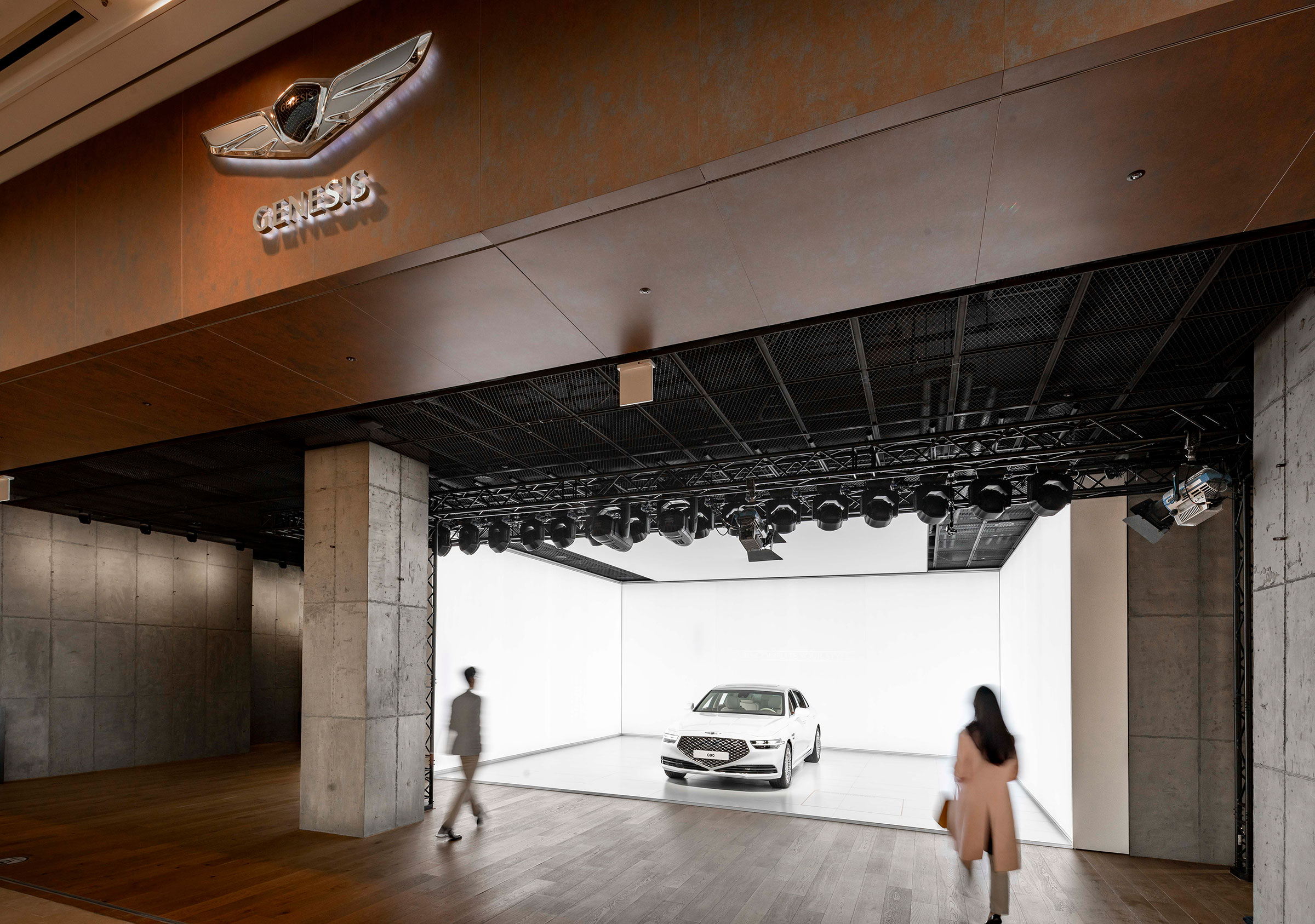
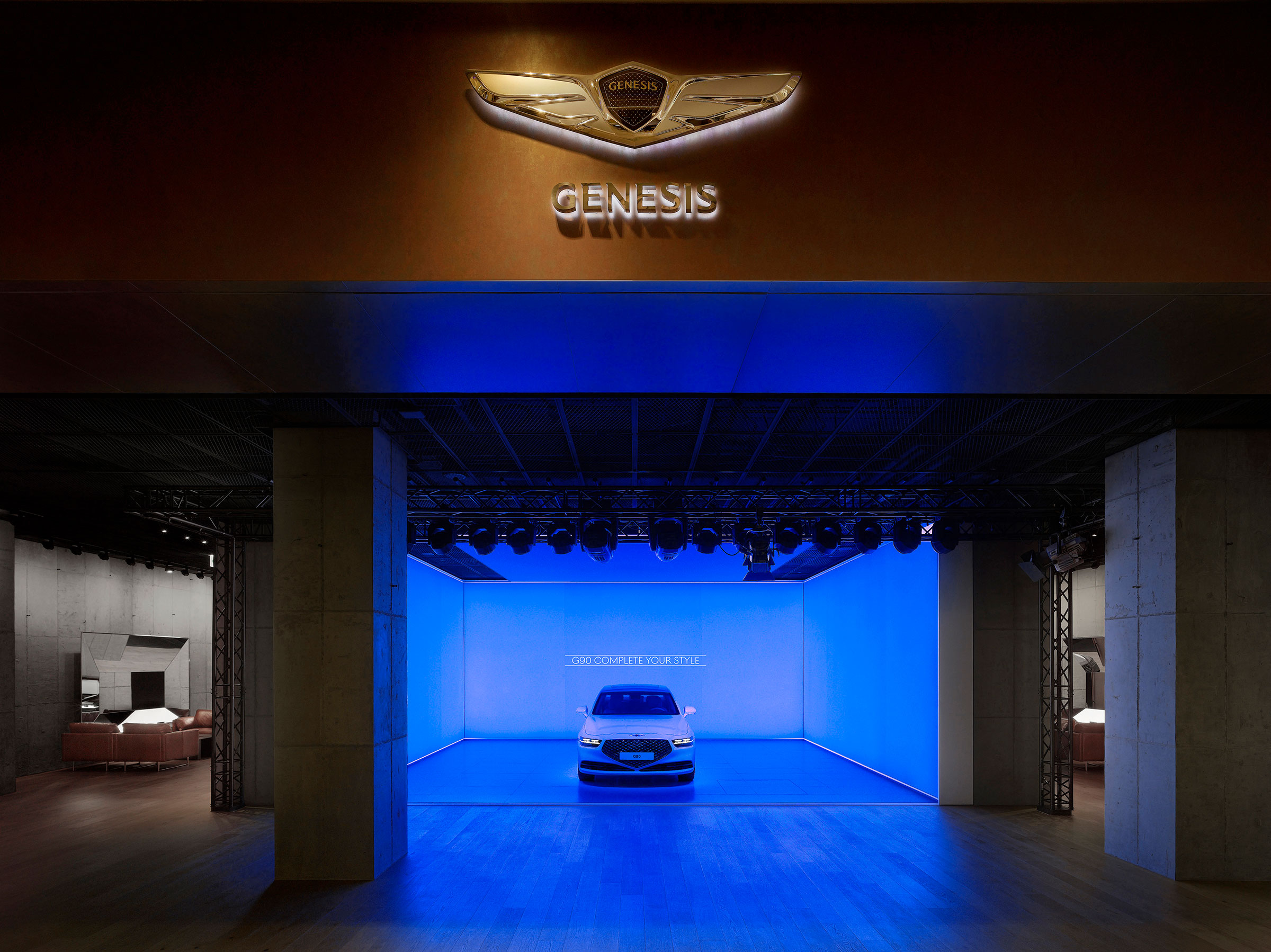
The studio showroom was originally built to introduce Genesis as an innovative brand to a young, design-savvy generation. Suh Architects was asked to design a distinct space to showcase Hyundai’s latest luxury product. In order to succeed in the competitive luxury car market, Genesis wanted to position itself as an independent brand, separate from its parent company Hyundai, which has a reputation of producing simple family cars suited to practical shoppers. The Genesis Studio in Hanam – first of many more brand studios to come – offers just that.
The space, which stretches across 460 square meters, is a subtle mix of showroom and art gallery. It mimics a refined, elegant boutique-style approach seen in dealerships by luxury auto brands like Lexus or BMW with personalized services by auto experts. At the Genesis Studio in Hanam, visitors are greeted by “gurus,” or trained car experts who are stationed at the showroom to guide and present details about the design and brand concept behind Genesis. Unlike other car showrooms, the space mainly exists to demonstrate the brand concept and support the customer’s experience rather than garnering revenue. Gurus at the site mainly serve as “curators” to explain the brand’s philosophy and services. Visitors interested making vehicle purchases are guided to separate agents.
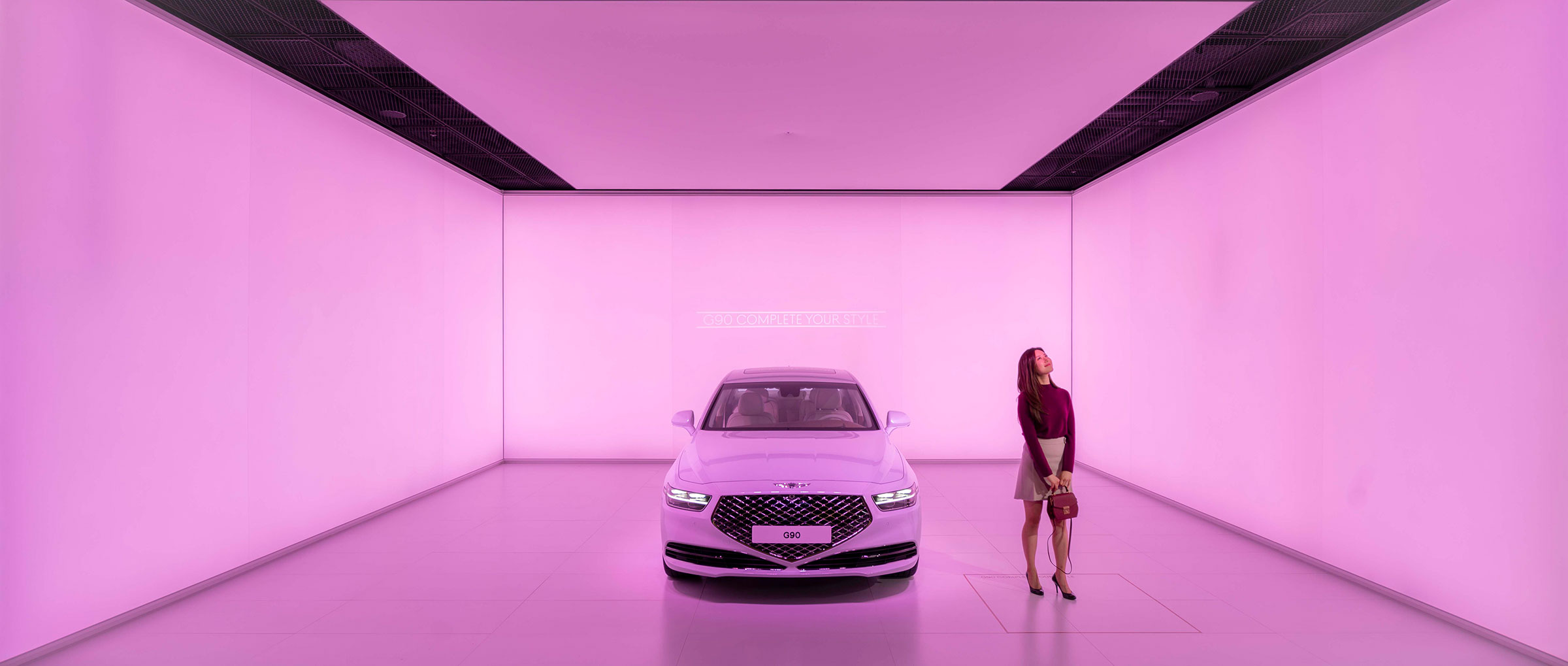
Overall, the showroom is testament to the marriage of craftsmanship and technology. Much like a concept store, the studio encourages shoppers to experience firsthand the materials and technologies used in the Genesis’ latest product. It includes a trademarked display of sample metal doors used in its latest models in a myriad of colors to recall an image of bird wings. The tinted mirrors on the walls framed in neon lighting provide a 360 degree view of the vehicle, and sample seating leathers are also on display for visitors to touch. Each element points to the care and precision with which each Genesis model is designed and built. On the right, a lounge welcomes customers with a quiet meeting room to serve as a living room for respite.
Suh Architects presents Genesis’ streamlined engineering as art. By creating a striking neon envelope of infinite mirrors for the car, the architects sought to engage each visitor on a visceral level, showcasing the abstract beauty and engineering of the car at first glance. The showroom gathers music, art and performance to bring inspiration.
Programmatically, the latest initiative in the studio was an interactive media project - “Complete Your Style: G90”, organized by a team of architects and designers to introduce the company’s newly-released G90, a full-size four door luxury sedan. As part of the concept of “participatory luxury,” a term dubbed by the Genesis team to introduce the Company’s newly released luxury sedan in an untraditional format, the project was strategically designed to encourage visitor participation.
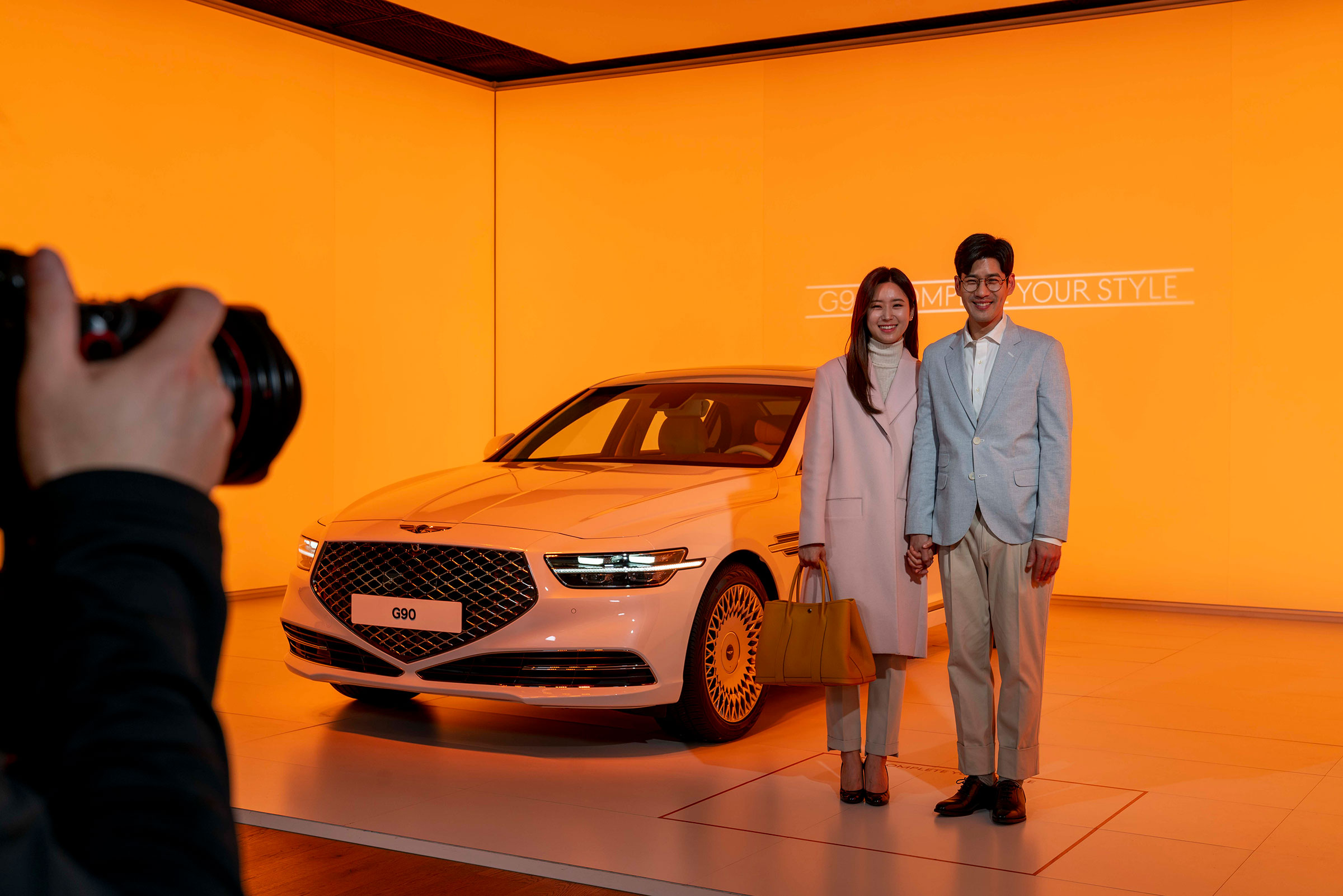
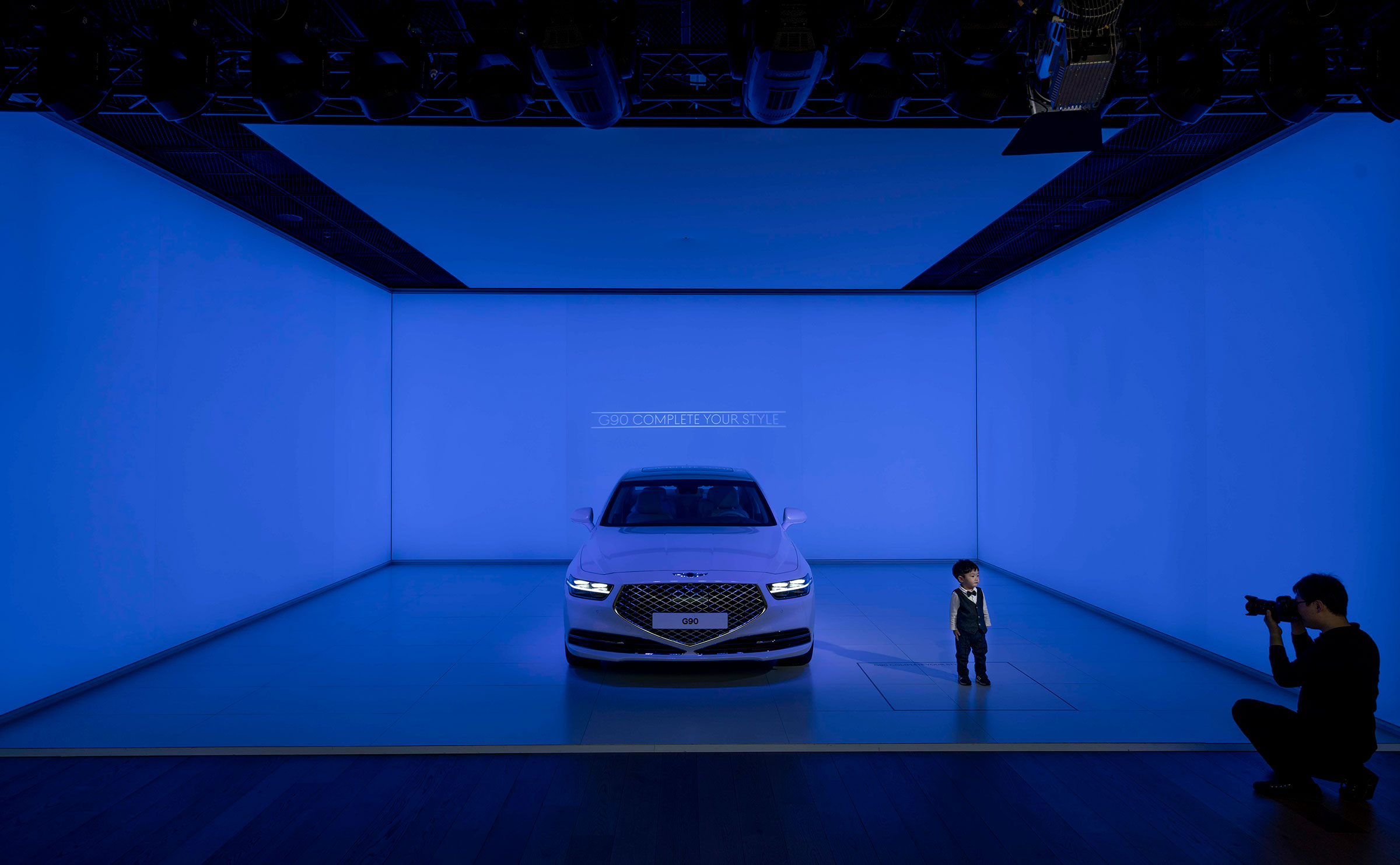
When a visitor entered this specially-built room in the center of the studio, the system automatically recognized a particular color from the visitor’s outfit– often bright and distinct—prompting the car and the surrounding walls to change into this customized color. The room, designed like a stage set complete with theater lighting equipment and sound system, featured a professional photographer stationed at the site who then photographs the visitors against the spectrum of changing colors. Couples and young family shoppers with strollers crowded into the studio to get a glimpse of the site and found a family portrait opportunity. Photos were printed as a gift, and displayed on the walls next to the room, where a video panel functions as an art exhibit.
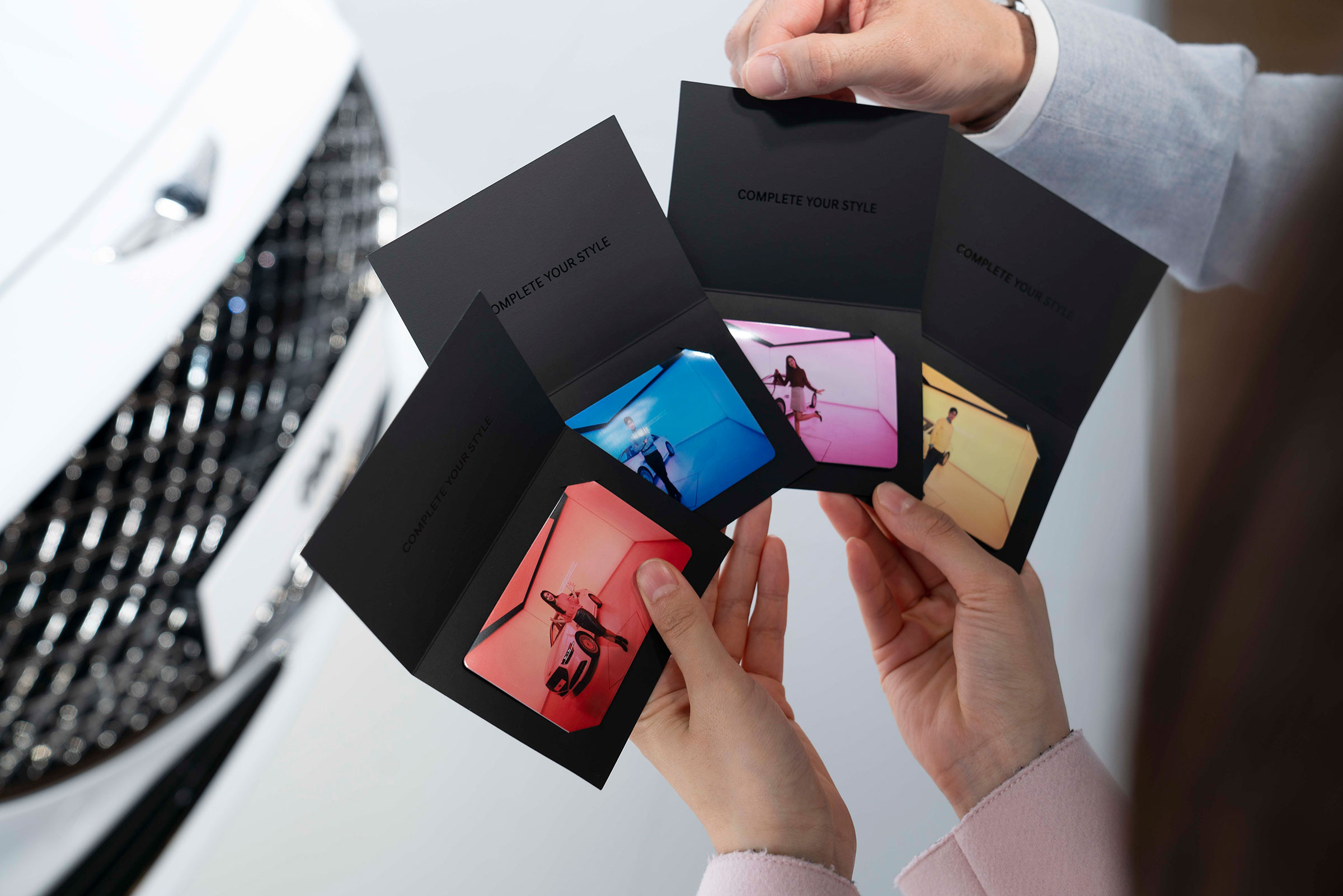
The project thus sought to allow visitors to freely experience and interpret the design of G90 by presenting a playful side of the brand. As Genesis seeks to appeal to a younger generation, the brand recognized that many millenials no longer identify with a traditional concept of luxury, but rather values personalized experiences—and the selfies they create.
From the product side, the project was an attempt to expand the appeal of the G90’s line-up of colors and allow more customized, interactive options for consumers.
Visitors immediately reacted to the experience. With an average of 2,000 visitors on weekdays, and 6,000 on weekends, the reception has been more enthusiastic than anticipated. Customers particularly enjoyed and appreciated the portraits of themselves taken by a professional photographer. As a satellite event, the company handed out souvenirs to visitors who posted their photographs with the Genesis hashtags on Instagram, and hosted “Genesis Talk” with designers of Genesis to explore and help audience understand the brand’s design identity.
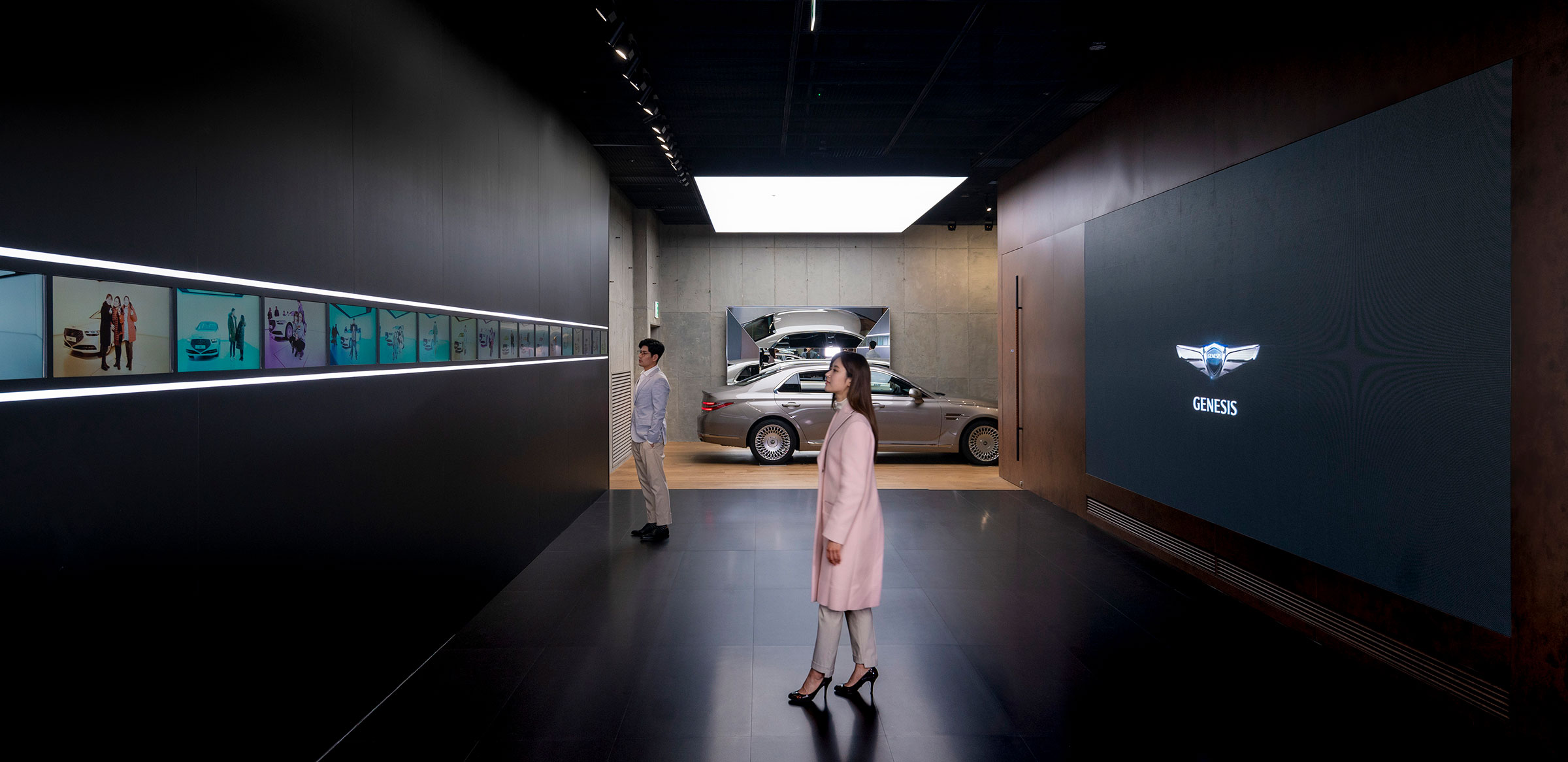
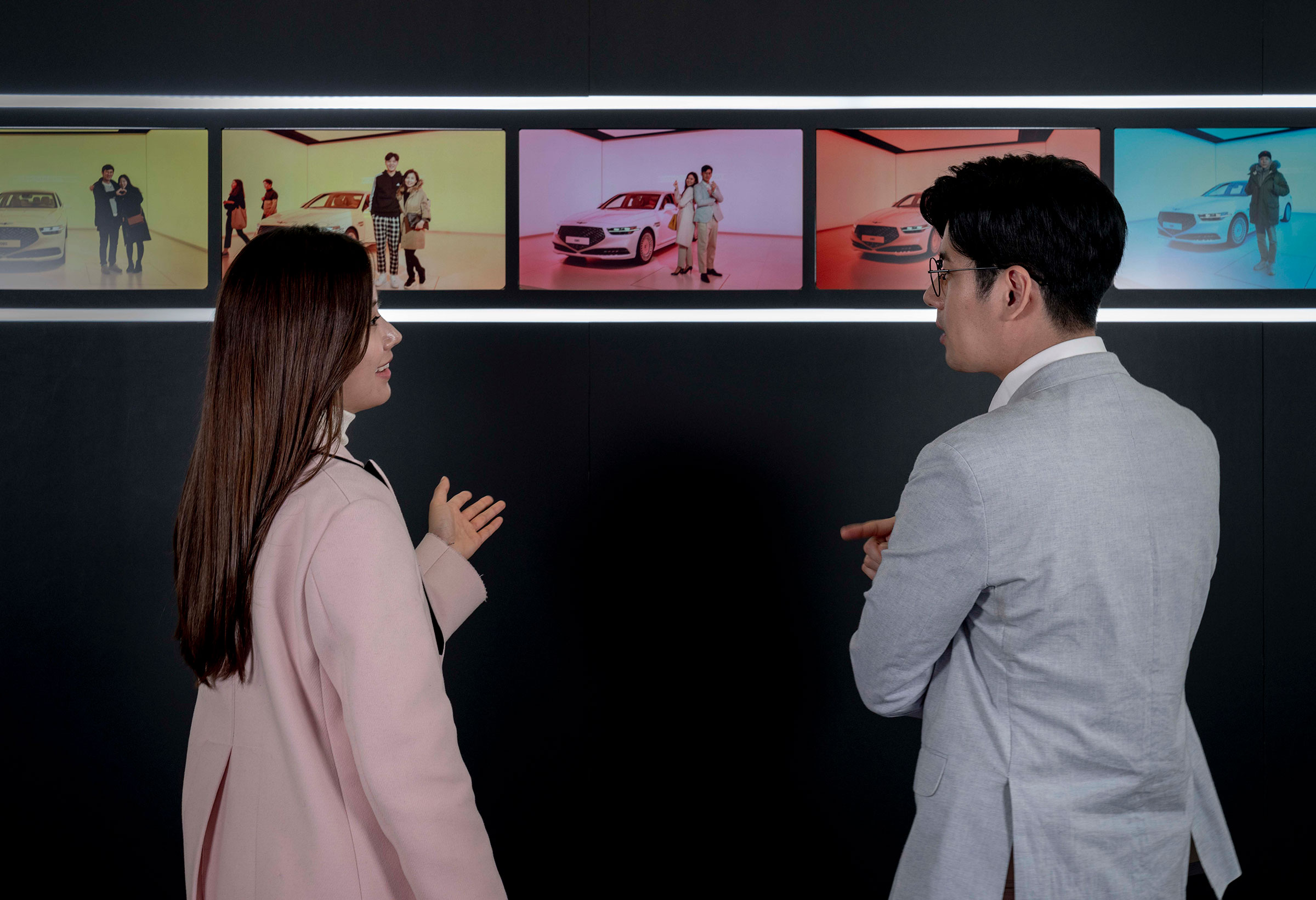
In many ways, the G90 project explores unconventional marketing methods. Unlike traditional car showrooms, which focus on vehicle performance and sales, Genesis focused on its design concepts to showcase the artisanal craftsmanship invested in its product, similarly to recent concept stores of luxury fashion labels.
Most importantly, the interactive design of the project began to change the perception of the brand as being younger and more playful, redefining the traditional notion of “a luxury car” for younger generations. Genesis’ design team continues to thus to reinterpret their concept of “modern luxury” with a fresh outlook, exploring design concepts that resonate with the millennial – a generation that are more inclined to purchase goods based on style and value rather than status or prestige. The G90 project also embodied the brand concept of Genesis as a product of today and tradition – the duality of modern Korean identity, deeply rooted in tradition and craftsmanship on the one hand, and devoted to style on the other - as is evident in the country’s ultra-modern culture advancing technology, art, fashion and K-pop.
As the first dedicated brand space for Genesis, the site in Hanam thus inspires its other next brand spaces, as the company continually plans explores diverse concepts and open in similar showrooms of major markets to build vibrant relationships with its expanding base of customers.
GENESIS G90
2019
Hyundai Motor Company (Genesis Motors)
When Hyundai Motors, the world’s fifth-biggest car maker, decided to enter the premium market and build their own top-tier luxury brand, the company did two things that disoriented, then reoriented the South Korean car market: it announced that it was creating a separate sub-brand named Genesis, and introduced a new “studio” showroom in various locations across the country.
One of the first studios was built in 2016 in a new, pristine, high-end shopping mall in the peaceful suburb of Hanam, about 30 kilometers east of Seoul. The site presented a spacious exhibition hall and an ideal location for a test-drive course for the company’s newly-released vehicles, as it was located near Misari, a pleasant riverside road neighboring a rowing track.


The studio showroom was originally built to introduce Genesis as an innovative brand to a young, design-savvy generation. Suh Architects was asked to design a distinct space to showcase Hyundai’s latest luxury product. In order to succeed in the competitive luxury car market, Genesis wanted to position itself as an independent brand, separate from its parent company Hyundai, which has a reputation of producing simple family cars suited to practical shoppers. The Genesis Studio in Hanam – first of many more brand studios to come – offers just that.
The space, which stretches across 460 square meters, is a subtle mix of showroom and art gallery. It mimics a refined, elegant boutique-style approach seen in dealerships by luxury auto brands like Lexus or BMW with personalized services by auto experts. At the Genesis Studio in Hanam, visitors are greeted by “gurus,” or trained car experts who are stationed at the showroom to guide and present details about the design and brand concept behind Genesis. Unlike other car showrooms, the space mainly exists to demonstrate the brand concept and support the customer’s experience rather than garnering revenue. Gurus at the site mainly serve as “curators” to explain the brand’s philosophy and services. Visitors interested making vehicle purchases are guided to separate agents.

Overall, the showroom is testament to the marriage of craftsmanship and technology. Much like a concept store, the studio encourages shoppers to experience firsthand the materials and technologies used in the Genesis’ latest product. It includes a trademarked display of sample metal doors used in its latest models in a myriad of colors to recall an image of bird wings. The tinted mirrors on the walls framed in neon lighting provide a 360 degree view of the vehicle, and sample seating leathers are also on display for visitors to touch. Each element points to the care and precision with which each Genesis model is designed and built. On the right, a lounge welcomes customers with a quiet meeting room to serve as a living room for respite.
Suh Architects presents Genesis’ streamlined engineering as art. By creating a striking neon envelope of infinite mirrors for the car, the architects sought to engage each visitor on a visceral level, showcasing the abstract beauty and engineering of the car at first glance. The showroom gathers music, art and performance to bring inspiration.
Programmatically, the latest initiative in the studio was an interactive media project - “Complete Your Style: G90”, organized by a team of architects and designers to introduce the company’s newly-released G90, a full-size four door luxury sedan. As part of the concept of “participatory luxury,” a term dubbed by the Genesis team to introduce the Company’s newly released luxury sedan in an untraditional format, the project was strategically designed to encourage visitor participation.


When a visitor entered this specially-built room in the center of the studio, the system automatically recognized a particular color from the visitor’s outfit– often bright and distinct—prompting the car and the surrounding walls to change into this customized color. The room, designed like a stage set complete with theater lighting equipment and sound system, featured a professional photographer stationed at the site who then photographs the visitors against the spectrum of changing colors. Couples and young family shoppers with strollers crowded into the studio to get a glimpse of the site and found a family portrait opportunity. Photos were printed as a gift, and displayed on the walls next to the room, where a video panel functions as an art exhibit.

The project thus sought to allow visitors to freely experience and interpret the design of G90 by presenting a playful side of the brand. As Genesis seeks to appeal to a younger generation, the brand recognized that many millenials no longer identify with a traditional concept of luxury, but rather values personalized experiences—and the selfies they create.
From the product side, the project was an attempt to expand the appeal of the G90’s line-up of colors and allow more customized, interactive options for consumers.
Visitors immediately reacted to the experience. With an average of 2,000 visitors on weekdays, and 6,000 on weekends, the reception has been more enthusiastic than anticipated. Customers particularly enjoyed and appreciated the portraits of themselves taken by a professional photographer. As a satellite event, the company handed out souvenirs to visitors who posted their photographs with the Genesis hashtags on Instagram, and hosted “Genesis Talk” with designers of Genesis to explore and help audience understand the brand’s design identity.


In many ways, the G90 project explores unconventional marketing methods. Unlike traditional car showrooms, which focus on vehicle performance and sales, Genesis focused on its design concepts to showcase the artisanal craftsmanship invested in its product, similarly to recent concept stores of luxury fashion labels.
Most importantly, the interactive design of the project began to change the perception of the brand as being younger and more playful, redefining the traditional notion of “a luxury car” for younger generations. Genesis’ design team continues to thus to reinterpret their concept of “modern luxury” with a fresh outlook, exploring design concepts that resonate with the millennial – a generation that are more inclined to purchase goods based on style and value rather than status or prestige. The G90 project also embodied the brand concept of Genesis as a product of today and tradition – the duality of modern Korean identity, deeply rooted in tradition and craftsmanship on the one hand, and devoted to style on the other - as is evident in the country’s ultra-modern culture advancing technology, art, fashion and K-pop.
As the first dedicated brand space for Genesis, the site in Hanam thus inspires its other next brand spaces, as the company continually plans explores diverse concepts and open in similar showrooms of major markets to build vibrant relationships with its expanding base of customers.